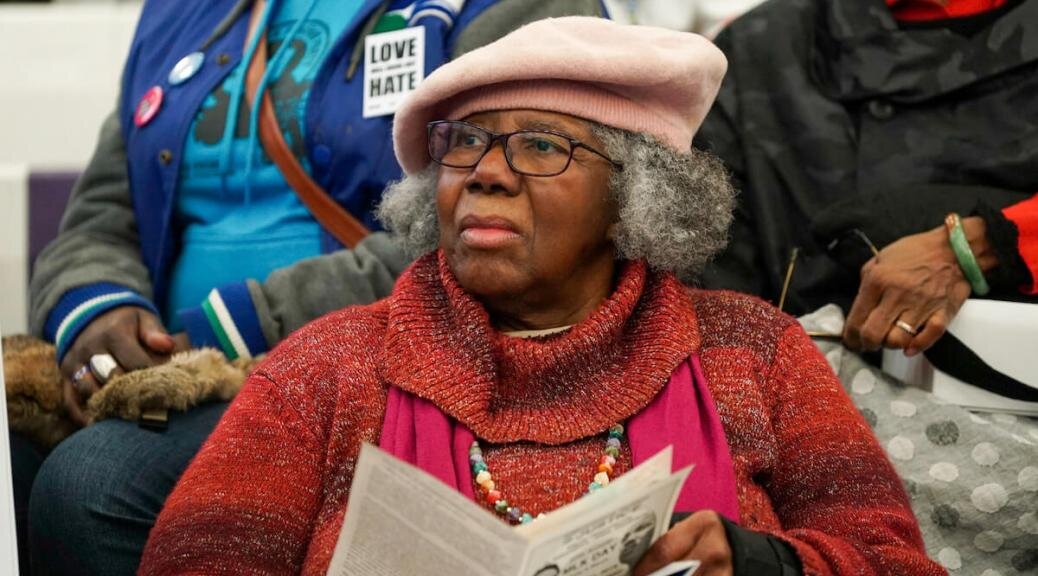30 Years of MFPA: Advocating for Police Transformation
Reprint from South Seattle Emerald
August 29, 2021
by Kamna Shastri
Reverend Harriet Walden has dedicated decades of her life to holding police accountable for their conduct, since long before slogans of “defund the police” echoed along city streets. In 1991, she founded Mothers Against Police Harassment, now known as Mothers For Police Accountability (MFPA). She is admired and respected for her work — and rightly so. A power-house with clear vision, Walden has been advocating for law enforcement to be held accountable for thirty years. Her legacy is powerful.
The incident that sparked Walden’s activism took place on a mid-summer evening on Aug. 5, 1990. One of Walden’s sons was riding home from a community festival with two friends. As the boys were rounding the corner at 29th Avenue South and South Jackson Street, Seattle police officers stopped them, saying they were looking for drugs. Walden’s other son was in the house nearby and came outside because of the noise. The four boys — all high school graduates on their way to college — began to argue with the police, explaining that they had no drugs in their possession, and the argument escalated.
In a 1995 interview on Network X, Walden recounts how the police held guns to the boys’ heads and that all four were beaten up and arrested. Walden was rightfully angry at how the police had treated her sons and their friends, especially as they were found wrongfully charged. Walden was able to get the charges dropped for the youth but sued the City of Seattle for misconduct.
Outraged by this incident, she and co-founder Janice Marie Bell and other women rallied together to form Mothers Against Police Harassment, a name they kept until 1996 when they realized their work was about far more than preventing harassment. It was about keeping police accountable. According to Walden, the group was the first in the nation to use the now-ubiquitous term “police accountability.”
The mothers began organizing by gathering information and educating the community on their rights and on strategies to use when interacting with the police. Their first newsletter, published in July 1991, featured tips on what to do when stopped by police and announced a workshop for youth to attend. The following newsletter included a recap of the event and an announcement stating that the governor had enlisted Walden to represent parents from across the state on a panel of citizens asked to study the State’s juvenile justice system.
In 1992, Walden and Bell were awarded the Civil Libertarian Award from the American Civil Liberties Union of Washington for their work not only bringing awareness to police harassment but understanding the layered relationships between police and community members. Their work considered not only the responsibilities of law enforcement but educating youth on their rights and responsibilities as well.
A few years later, MFPA helped bring Crisis Intervention Training to the Seattle Police Department (SPD) after the deaths of elderly community members. One elderly man who lived on 24th and Jackson was killed by police after behaving erratically due to a mental health crisis. The same happened to an elder in the University District. A group of community organizations including MFPA rallied together before SPD and made the case that police officers needed to be trained to deal with mental health crises.
“The police department was convinced that we were right and that police officers needed to be trained to handle people with mental health crises,” said Walden in an interview with Talking Stick TV in 2017. While the CIT program isn’t perfect, it was derived from a similar model instituted by the Portland Police Bureau in the 1990’s. The goal was that all officers would be trained in crisis intervention, but SPD wasn’t able to see this goal through and the training has remained voluntary.
In the same interview, Walden reflected on how disappointing it has been to see that after so many years, the CIT program has not worked. She pointed to one of the officers who responded to the 911 call that brought police to the door of Charleena Lyles, eventually leading to her death. “After all these years it didn’t work. When it’s not working and it goes bad, it goes bad badly,” she said.
Walden and MFPA have been at the table throughout SPD’s accountability debacles, from being placed under a consent decree to being part of the Community Police Commission meetings with Mayor Durkan and former Chief of Police Carmen Best after numerous instances of alleged police misconduct during the 2020 summer of protests in Capitol Hill.
Their work is not easy. As Walden said in her 2017 interview, it involved a “lot of policy review, engagement in community, getting the word out there, and being that place where the community knows they can come and actually be heard.”
To this day, MPA continues to be a powerful voice in transforming law enforcement policies, increasing community policing, and a variety of issues that have become of wider public interest in the past few years. They’ve received grants from the City of Seattle and Seattle Foundation’s Neighbor to Neighbor (N2N) program to support their community engagement work.
Most recently, MFPA called on the Seattle City Council to address increasing accounts of gun violence in Seattle.
Part of what informs the organization and Walden’s work is considering the needs of youth, especially the way public education and other public institutions have fallen short. In a 2012 interview with Talking Stick TV, Walden said that young people have internalized that they have no value, especially in schools where teachers do not take the time to encourage young people, expending resources on teaching to the test and penalizing youth.
A broken education system, a military approach to teaching, and law-enforcement violence and harassment that targets Black youth has created what Walden characterizes as a useless war.
“Most people around the world, its wars about land or food or some right to exist. This is not a ‘right-to-exist kind of war — this is a war on youth, on kids … what is this beef about?” said Walden in the 2012 interview.
Walden emphasizes the importance of creating a village of care, where even outside the home young people and children have a sense of being cared for by elders in the community, whether that be while they are riding the bus, in school, or at the corner store. The intergenerationality of community rings true as an important factor to create a network of care where youth can feel safe and supported.
MFPA is, in a sense, “reordering” the world through dialogue and community education. Alongside the hard work of changing policy and working with political players like the City Council and State Legislature, Walden also believes in the power of beauty to bring about change.
Referring to a community program where MFPA brought youth living in the city to the Skagit Valley tulip farms, Walden said in 2012, “I think extreme beauty also changes people — will actually open you up to a deep joy. So, I am just hopeful.”
While there are a number of transformations that need to happen for a just law enforcement system that does not prey on Black youth and Youth of Color, organizations like Mothers for Police Accountability are carefully doing the work to consider how to keep young people safe and help them thrive from multiple perspectives.

